- Home
- Nick Carter
Six Bloody Summer Days
Six Bloody Summer Days Read online
Annotation
DESERT DEATH TRAP.
The American Ambassador assassinated. President Mendanike dead in an "accidental" plane crash. His beautiful widow held prisoner. A ruthless, devious man named Abu Osman plotting to overthrow the new government. And Colonel Mohammed Doosa, head of the Russian-style secret police, with his own murderous plans…
AXE might have let the small North African republic boil in its own bloodbath if it hadn't been for "Cockeye" — the stolen missile, the deadliest weapon in NATO's nuclear arsenal. Killmaster's assignment: walk into this desert hell, alone, find the missile — and destroy it.
He didn't have much time. He had exactly SIX BLOODY SUMMER DAYS!
* * *
Nick Carter
Chapter 1
Chapter 2
Chapter 3
Chapter 4
Chapter 5
Chapter 7
Chapter 8
Chapter 9
Chapter 10
Chapter 11
Chapter 12
Chapter 13
Chapter 14
Chapter 15
Chapter 16
Chapter 17
Chapter 18
Chapter 19
Chapter 20
Chapter 21
* * *
Nick Carter
Killmaster
Six Bloody Summer Days
Dedicated to The Men of the Secret Services of the United States of America
OCR Mysuli: [email protected]
Chapter 1
I sat in the boat and listened to the silence. The water was shimmering gold in the sun. I squinted against its brightness, my eyes scanning the conifers clustered in gnome-like conclaves at the lake's edge. Black spruce and birch climbed to the ridges. But nothing larger than a gnat moved within range of my vision. It was unnatural; a combination of factors. I could wait, or I could start the action. I don't like waiting. What I was after might not like waiting either. My right arm came back smoothly, my left hand loose and relaxed, and then the forward motion, straight forward, and careful with the wrist.
The silence held. My left hand began its delicate assignment. I could feel the sweat on my neck and forehead. The weather was out of joint. It should have been sharp and cool with a breeze ruffling the water. Instead, I saw a single small lip of wave and caught the discoloration beneath it. Steady!
My adversary made his move. Murderously swift, and right on target, he struck… and ran. He was three pounds if he was an ounce, all speckled arctic char and full of fight. I stood to do battle. For two days I'd been after him. I knew that although the other trout would He deep in the water because of the unseasonable heat, this loner liked to go his own way, to feed in the shallows amongst the reeds. I'd seen him. I'd stalked him, and there was something about his independence that I liked. Maybe he reminded me of me, Nick Carter, enjoying some much-needed R&R on a wilderness lake in Quebec.
I knew he'd be a fighter, but he was more; he was full of guile. Maybe more Hawk than Carter, I thought, as he darted under the boat and tried to foul the line. "No such luck, chum," I said. It seemed for a moment there were only the two of us, contesting in an empty world. But it couldn't last, just like the stillness couldn't last.
A gnat's buzz, but then louder than that, a noise of complaint building to a familiar whuf-whuf-whuf. A mote in the sky heading straight toward me, and I needed no magic reflection in the water to tell me it meant goodbye to R & R and another five days of fishing in Lac Closse. The life of a secret agent is never more apt to be interrupted than when he is recovering from the hazards of his profession.
But not now, dammit! I was proving that not all fishing stories are a foot long and a shark's belly wide. I had a whale on the line, and everything else would have to wait. But it wouldn't.
The big RCAF AB 206A came bumbling in right over me, and the down thrust of its fans not only churned up the water but nearly knocked me over. I was not amused. I waved the bloody thing off, and it skittered sideways like an overgrown dragonfly.
My adversary had gone deep in the noise and confusion. Now he shot to the surface and broke water, shaking like a terrier, trying to throw the hook. I hoped the sight would impress whoever was sitting up in the chopper. It must have, because they sat up there in the air motionless, making a helluva racket while I played my friend on the line. He broke water a half a dozen times more before I got him close to the boat. Then there was the tricky business of keeping the line taut with my right hand while getting the net under him with my left. In fishing, if you want the fish, you never hurry it. You stay cool and easy, coordinated; something I'm good at.
Maybe he wasn't a foot long, but he looked it. And the color of him — a rich tan, full of reds and browns with a handsome speckled belly. He was exhausted but he wasn't quitting. Even when I held him up for my aerial audience, he tried to shake loose. He was too free and full of spirit to put over a fire, and besides, I knew I was leaving. I kissed his slimy head and threw him back where he belonged. He broke water once, not in thanks, but in defiance, and then he was gone.
I rowed in to the shore, tied the boat to the dock and collected my gear from the cabin. Then I went out to the end of the dock and the chopper dropped its rope ladder, and I climbed on up, breathing balsam and pine, saying goodbye to peace and relaxation.
Whenever I, or any AXE agent, is given R & R time, we know it is borrowed like all the rest of our time. In my case, I knew, too, that if it was necessary to contact me, the RCAF would be used to carry the message, so it had been no surprise to see the chopper come whirling over the treetops. What did surprise me was to find Hawk waiting for me inside.
David Hawk is my boss, the director and chief of operations for AXE, the smallest agency in the U. S. Government and the most lethal. Our business is global espionage. When it comes to the rough stuff, we take over where the CIA and the rest of the intelligence boys leave off. Besides the President, fewer than ten officials in the whole bureaucracy know we exist. Which is the way Intelligence is supposed to be. AXE is like Ben Franklin's axiom: Three people can keep a secret if two of them are dead. We're the one that stays alive, and Hawk is head man. At first glance, you might get the idea he's an over-aged, not too successful used car dealer. Good cover for a man I consider to be the shrewdest operator in the deadliest game of all.
As I stuck my head up through the hatch and a crewman reached to give me a hand with my bag, I saw Hawk bent over his cupped hands, trying to get his ubiquitous cigar lit in the draft. By the time I was up and in and the hatch closed, he was sitting with his head tilted back, contentedly sucking smoke and brimstone from the foul smelling brand of cheroot he cherishes.
"Nice catch you had there," he said cocking a sardonic eye at me. "Sit down and fasten up, so we can get out of this wilderness paradise."
"If I'd known you were coming, I would have caught two, sir," I said, sitting down beside him.
His rumpled suit fit him like a cast-down gunny sack, and there was no doubt that the nattily coveralled crewman couldn't figure out why there was such VIP treatment for an unkempt old geezer and a fair-to-middlin' trout fisherman.
"Son," Hawk's rasp rose over the chopper's heavy huffing, "see if you can go help the pilot."
The crewman, a corporal, hesitated only a moment. Then with a curt nod, he moved forward toward the cockpit. The blandness in Hawk's expression departed with him. Now the lean lined face took on a cast that often made me think someone in Hawk's family tree had been a Sioux or Cheyenne war chief. The expression reflected a contained force, full of sagacity and perception, ready to act.
"Sorry about the interruption. We've got a DEFCON Alert." Hawk used official words like a Scotsman spends money.
"Global, sir?" I felt a faint tingling in the back of my neck.
"No. Worse." He had his attaché case on his lap as he spoke. "This will give you the background." He handed me an AXE briefing folder with a red stripe on the cover, which meant for the eyes of the President only. This was a second copy. There was a short summary. It read like the fleshed-in scenario of a conversation Hawk and I had had no more than a week past. That didn't mean that AXE headquarters at Dupont Circle in the nation's capital was bugged. Behind the shopworn cover of the Amalgamated Press and Wire Services, we are unbuggable. Nor did it mean we were clairvoyant, although there are times when I'm sure Hawk has the gift. It simply meant that from existing conditions one can conclude, without using a computer, that there will be certain results. In this case the result was overdue — nuclear theft. It was also nuclear theft of a new top secret tactical weapon, which meant there would be some ticklish diplomacy decisions on the part of the President.
The Cockeye is in the SRAM class — short range attack missile. It is an off-shoot of the Shrike, which we supplied the Israelis during the Yom Kippur war. There the similarity ends. The Cockeye is a nuke, and unlike any other short range tactical nuclear weapon, it is ninety percent efficient. Translated, that means whereas other nukes of the same size and type — whether in Warsaw Pact arsenals, Peking bunkers, or our own — can take out a city block, the Cockeye can take out a city. An extremely mobile cylindrical object, exactly sixteen feet long, weighing less than a half a ton, with a range of 150 miles, the Cockeye is a strong ace to have in your defensive deck. And having it had rubbed some of the worry lines out of the faces of our plans and policy people at SHAPE and in the Pentagon.
Reading the details of the Cockeye's loss, one factor was obvious; the expertise of those who carried out the operation. It was a smooth, slick job, and showed a precise knowledge of the layout of the bunkers at Katzweiller just north of Kaiserslauten in the Rheinland Platz, where a squadron of Cockeyes were stored.
There had been thick fog, not unusual at this time of year or at the hour of 0300. There were no survivors in the fifty-man guard complement, and the details of time and movement had been put together by CID after the fact. They came in a truck, later found, disguised as a U. S. Army six by eight. Had they not been wearing G. I. clothes, it was assumed they would have met at least some resistance. Knives were used on the three M.P.s on duty at the gate, and on the bunker guards. From the position of the bodies of the latter, it was assumed that they thought their killers were their relief. The two officers and the others died in their beds, gassed. Cute.
Only one Cockeye complete with nuclear warhead was stolen. Immediate suspicion would focus on the KGB or the Chicom SEPO, using a team of Caucasian Maoists.
But not for long. At the same time the Cockeye was being lifted, another theft was being carried out a few kilometers to the south at a storage depot at Otterbach. It was not the same group that stole the Cockeye, but the same techniques were used. In this case, the object snatched was our latest model RPV — Remote Pilotless Vehicle — black box and all.
The RPV isn't much longer than the Cockeye. It has short stubby wings and it can fly at mach 2. Its principal use has been photo-reconnaissance. But mate a Cockeye on an RPV, and you've got a nuclear missile with a range of 4200 miles and the capacity to kill a million people.
"Nuclear blackmail, here we come," I said.
Hawk grunted, and I reached for one of my custom made cigarettes to try to tone down the smell of his cigar.
There was a single paragraph devoted to what might be called the bitter pill:
Due to conditions of time and weather and the elimination of all personnel involved, discovery of the theft at Katzweiller did not occur until 0540 hours and at Otterbach until 0555 hours. Although USECOM at Hiedelberg and SHAPE at Casteau were immediately appraised of the Otterbach attack, U.S. and NATO Headquarters were not informed, for reasons presently under investigation, of the Cockeye's disappearance until 0730 hours.
"Why the snafu?" I said, looking up.
"Some rank-happy brigade commander who thought he could solve it all himself because he located the truck. It could have made the difference."
The next evaluation told why. AXE, like all Allied intelligence agencies, had thrown everything into a maximum effort to hunt down the killers and recover the stolen goods. There wasn't a truck, train, bus, or plane moving anywhere in a 1500-kilometers radius of Kaiserlauten that wasn't being stopped and searched. All ground transportation crossing western European frontiers and Iron Curtain borders was being double checked. Aerial surveillance, utilizing special detection devices, was blanketing the globe. Every agent in the field from Kirkenes to Khartoum had a single mission — find the Cockeye. Had the buzzer been pushed to mount the effort at the time of discovery instead of nearly two hours later, I might have still been fishing.
An AXE Prelim, had come up with a working assumption based on four criteria: 1. No major adversary power had carried out the operation. They had their own RPVs, and to steal one as a diversion would have been too high a risk. 2. The theft of the RPV, therefore, was as important to the operation as was the theft of the Cockeye. 3. Time was the key factor once the theft had taken place. Those who carried out the dual operation could not know how much time they had. This meant an immediate need for concealment or transportation out of the area.
If retained in the area, the possessors would be under constant pressure of discovery, and their ability to act would be severely restricted. 4. The Cockeye and the RPV were most probably flown from a suspected point within the area to a suspected point outside of it.
An examination of the movement of all aerial traffic within the zone of action directly following the thefts offered a single clue. A DC-7 propeller-type cargo plane, belonging to the North African Peoples Republic had taken off from Rentstuhl Flugzeugtrager outside of Kaiserlauten at 0500 on the morning in question.
The aircraft had arrived a week earlier for engine maintenance work, Rentstuhl specializing in the overhaul of non-jet aircraft.
With the fog, the DC-7 had taken off under bare minimums. Its manifest, which had been checked by customs the night before, showed it was carrying spare engine parts. Parked at the far end of the field ramp, the plane was in an isolated position and, in the fog, not visible from the tower or administration building during the critical period.
The flight crew of three, appearing to be NAPR military pilots, had arrived at operations at 0400. They had filed a flight plan for Heraklion airport in Athens. At 0720, Civitavecchia Air Traffic Control was informed the flight plan had been changed to Lamana direct, capital of the NAPR.
Possible conclusion: the Cockeye and the RPV had been on board the DC-7.
"That's kind of thin, sir," I said, closing the folder.
"That was yesterday. It's gotten fatter since, and I know what you're thinking — that Ben d'Oko Mendanike of the North African Peoples Republic would never get himself mixed up in anything like this."
That's what I had been thinking.
"Well, he's not mixed up in it anymore. He's dead." Hawk waggled the stub of his cheroot, and squinted his eyes against the sun coming in the port." So's Carl Petersen, our Ambassador to the NAPR. Both of them killed after they had met for a secret meeting. Petersen by hit and run truck and Mendanike in an air crash at Budan about three hours later, and all in the same time reference as the swiping of the Cockeye."
"It could be coincidence."
"It could, but have you got any better ideas?" he said grumpily.
"No, sir, but aside from Mendanike being incapable of planning nuclear theft, he hasn't got anyone in that rat pack army of his that could rob a piggy bank. And, as we both know, the situation in the NAPR has long been ripe for a colonel's coup."
He gave me a hard look. "I don't think I'll let you go fishing again. One!" He held up his thumb. "The nuke and the RPV are swiped from point A. Two!" Up came his forefinger. "Until something bett
er comes along, that DC-7 is the only damned lead we've got. Three!" Up came the remaining fingers — and I noticed he had a long life line — "Nick Carter is leaving for point B to see if he can find what was taken from point A. Clear?"
"More or less." I grinned at him, and the sour look gave way to what might be called his benign scowl.
"It's a dinger, son," he said quietly. "I know it's thin, but there's no time. There's no telling what the bastards have in mind. The President has been put in the spot of having to get on the hot line to Moscow and Peking to inform our partners in detente that we've lost a weapon they don't know anything about and that it could be aimed at one of their cities."
Hawk is not the worrying kind. Neither of us are. Otherwise, he wouldn't have been sitting where he was, and I wouldn't have been sitting next to him. But in the fading afternoon light the lines in his face seemed a little more deeply etched, and behind the steadiness of his pale blue eyes there lurked a glimmer of concern. We had a problem.
To me, that is the name of the game, something I've been accused of thriving on. Strip away all the ands, ifs, and buts, get rid of the official jargon and it's simply a matter of how you proceed.
We were proceeding, Hawk informed me, to Dorval Airport outside of Montreal. There I'd be boarding an Air Canada flight, direct to Rome, then an NAA Caravelle to Lamana. I was going in as Ned Cole, chief correspondent for Amalgamated Press and Wire Services — AP&WS. My assignment — to report on the sudden and tragic death of Prime Minister Ben d'Oko Mendanike. The cover was solid enough. But for back-up I was carrying a second passport, a French one, in the name of Jacques D'Avignon, hydrologist and water engineer for the Euro-combine RAPCO. Fresh water to the NAPR was on a par with oil. They had damned little of either.
We had no AXE personnel on the scene to backstop me. I said we were small. My only official contact would be Henry Sutton, CIA resident cum U.S. embassy commercial attaché. He would be expecting me in connection with the Ambassador's death, but unaware of my real mission. Even in a situation like this, AXE policy is to divulge operational plans to cooperating intelligence agencies only at the discretion of the agent in the field.

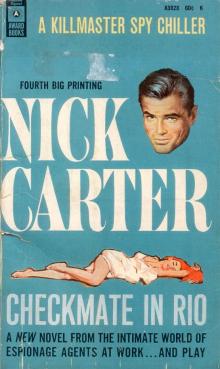 Checkmate in Rio
Checkmate in Rio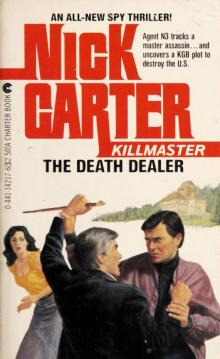 The Death Dealer
The Death Dealer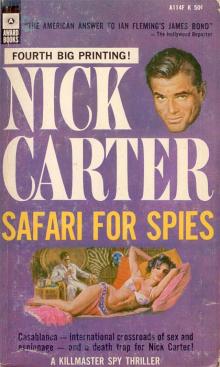 Safari for Spies
Safari for Spies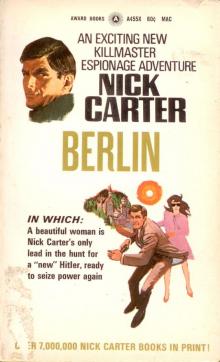 Berlin
Berlin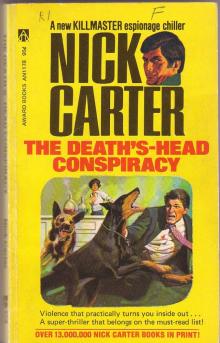 The Death’s Head Conspiracy
The Death’s Head Conspiracy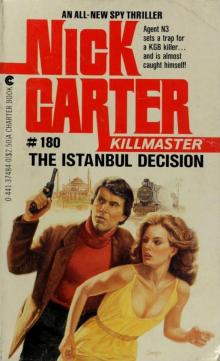 The Istanbul Decision
The Istanbul Decision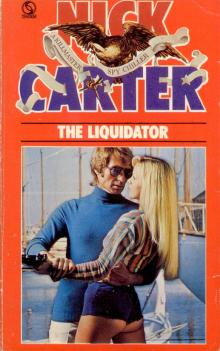 The Liquidator
The Liquidator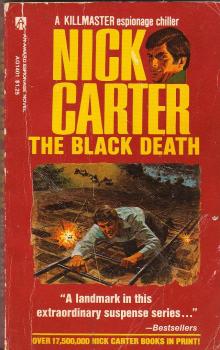 The Black Death
The Black Death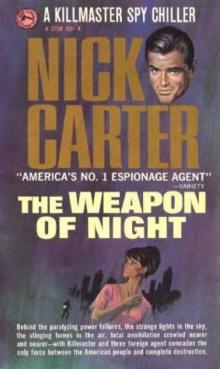 The Weapon of Night
The Weapon of Night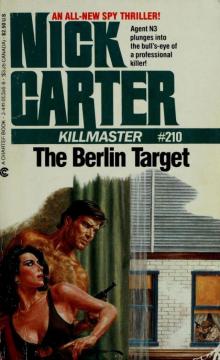 The Berlin Target
The Berlin Target Temple of Fear
Temple of Fear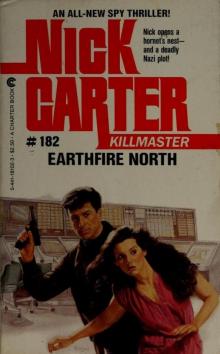 Earthfire North
Earthfire North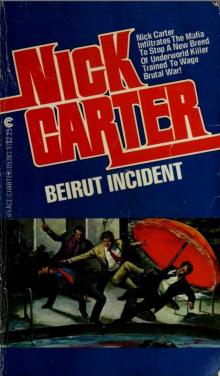 Beirut Incident
Beirut Incident White Death
White Death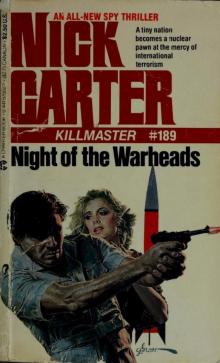 Night of the Warheads
Night of the Warheads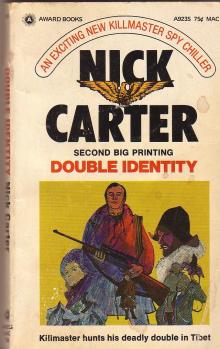 Double Identity
Double Identity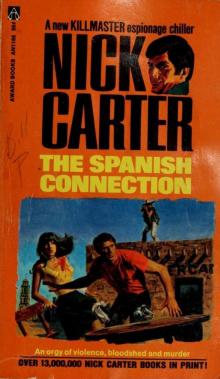 The Spanish Connection
The Spanish Connection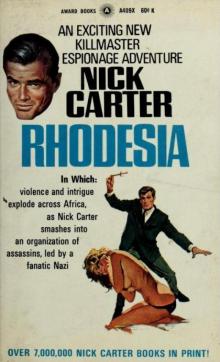 Rhodesia
Rhodesia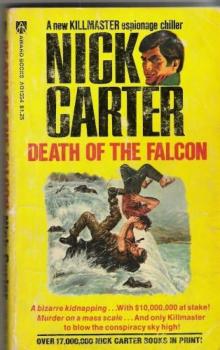 Death of the Falcon
Death of the Falcon The Executioners
The Executioners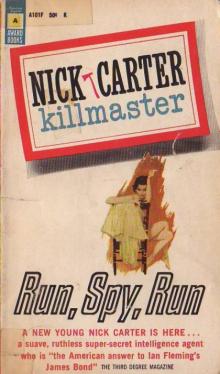 Run, Spy, Run
Run, Spy, Run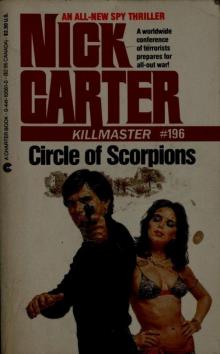 Circle of Scorpions
Circle of Scorpions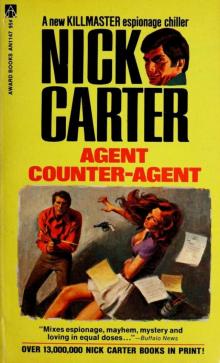 Agent Counter-Agent
Agent Counter-Agent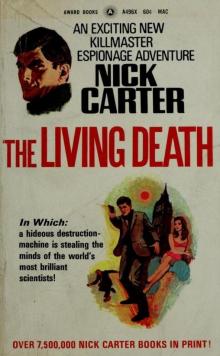 The Living Death
The Living Death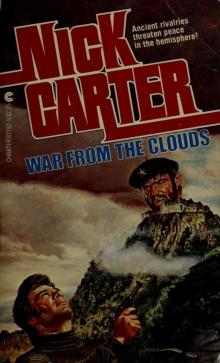 War From The Clouds
War From The Clouds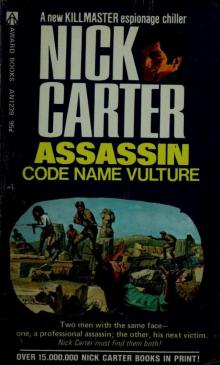 Assassin: Code Name Vulture
Assassin: Code Name Vulture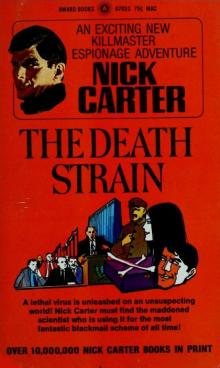 The Death Strain
The Death Strain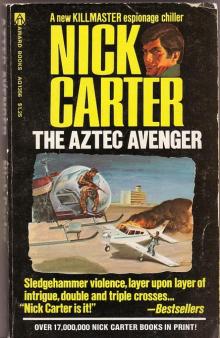 The Aztec Avenger
The Aztec Avenger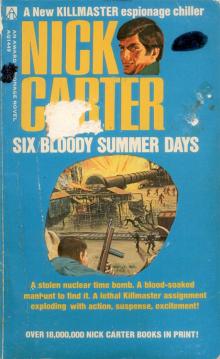 Six Bloody Summer Days
Six Bloody Summer Days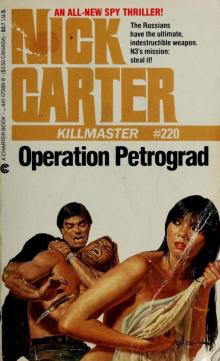 Operation Petrograd
Operation Petrograd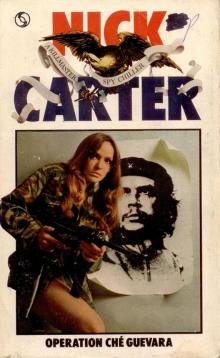 Operation Che Guevara
Operation Che Guevara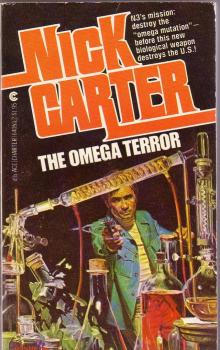 The Omega Terror
The Omega Terror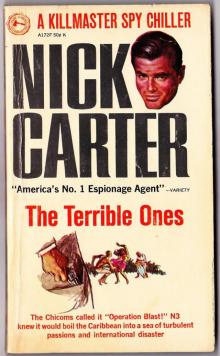 The Terrible Ones
The Terrible Ones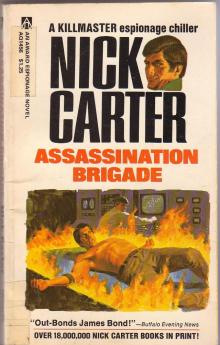 Assassination Brigade
Assassination Brigade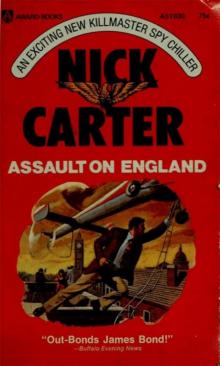 Assault on England
Assault on England The Judas Spy
The Judas Spy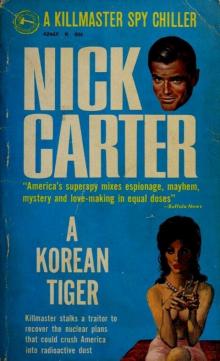 A Korean Tiger
A Korean Tiger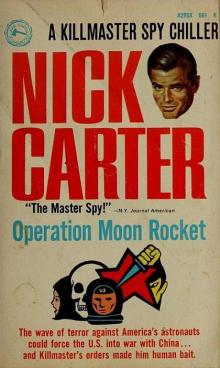 Operation Moon Rocket
Operation Moon Rocket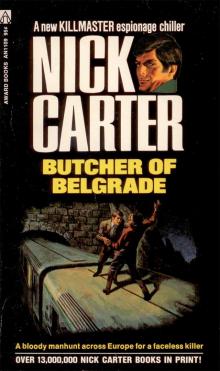 Butcher of Belgrade
Butcher of Belgrade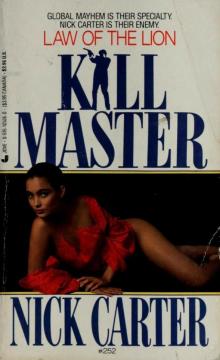 Law of the Lion
Law of the Lion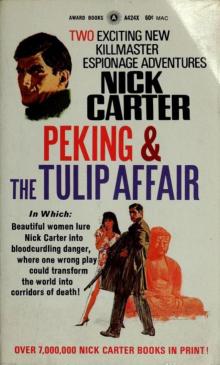 Peking & The Tulip Affair
Peking & The Tulip Affair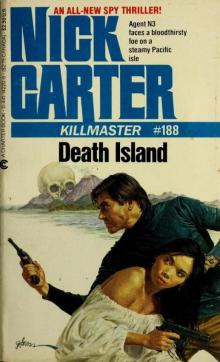 Death Island
Death Island The Jerusalem File
The Jerusalem File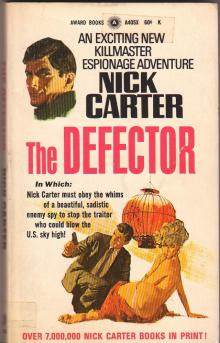 The Defector
The Defector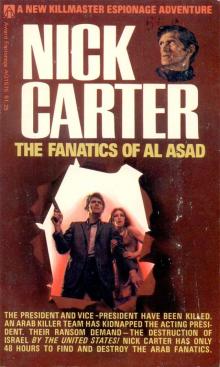 The Fanatics of Al Asad
The Fanatics of Al Asad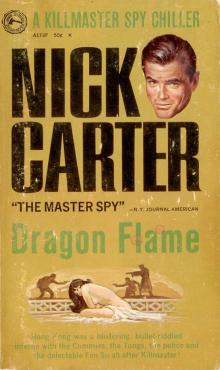 Dragon Flame
Dragon Flame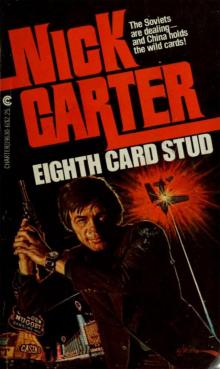 Eighth Card Stud
Eighth Card Stud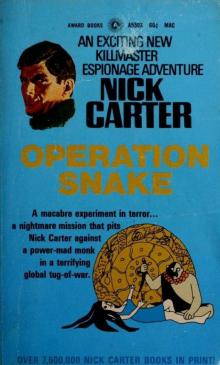 Operation Snake
Operation Snake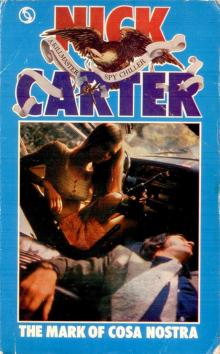 The Mark of Cosa Nostra
The Mark of Cosa Nostra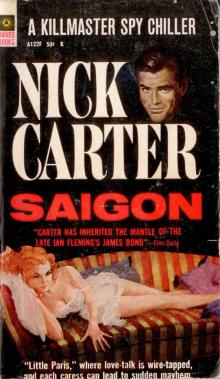 Saigon
Saigon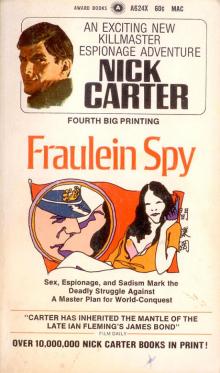 Fraulein Spy
Fraulein Spy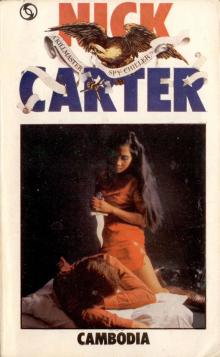 Cambodia
Cambodia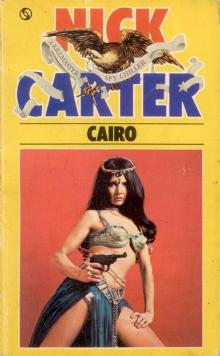 Cairo
Cairo